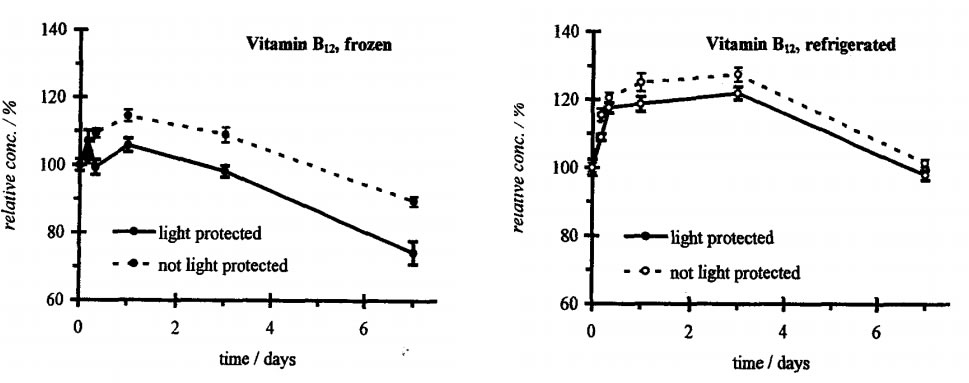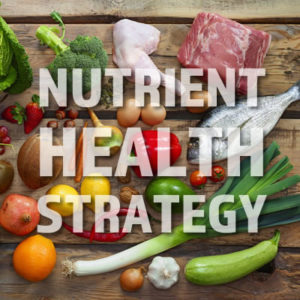Vitamin B9 - Folate
Folate (vitamin B9) is important in red blood cell formation and for healthy cell growth and function. B9 is crucial during early pregnancy to reduce the risk of birth defects of the brain and spine. Vitamin B9 is a water-soluble B vitamin that is naturally present in some foods, added to others, and available as a dietary supplement. Folate is the generic term for both naturally occurring food folate and folic acid. The fully oxidized monoglutamate form of the vitamin is used in dietary supplements and fortified foods. Folic acid consists of a p-aminobenzoic molecule linked to a pteridine ring and one molecule of glutamic acid (a building block of glutathione).
While most fruits and vegetables contain small amounts of vitamin B9, the principal sources are dark green leafy vegetables, legumes, orange and grapefruit juice, peanuts and almonds. Meat generally contains low amounts of vitamin B9, with the exception of offal such as liver and kidney, which are particularly high in B9. The recommended daily amount of B9 for adults is 400 micrograms. Women who are planning pregnancy should take lots of vitamin B9 as it's critical in the early stages of pregnancy.

Vitamin B9 is needed for copying and synthesizing DNA, producing new cells and supporting nerve and immune functions. Studies show that a diet high in folate-rich foods can help prevent cancer, heart disease, birth defects, anemia and brain function decline. Vitamin B9 is critical for the:-
- Conversion of homocysteine to methionine. High homocysteine levels are thought to contribute to plaque formation by damaging arterial walls. heart attacks and strokes.
- Methylation of deoxyuridylate to thymidylate in the formation of DNA, is required for proper cell division.
Methylation is a key role of Vitamin B9. This is where the CH3 replaces a hydrogen in another compound. Vitamin B9, vitamin B12, choline and betaine are all critical methylators in the body.
The total body content of folate is estimated to be 10-30 mg; about half of this amount is stored in the liver and the remainder in blood and body tissues. 400 mcg DFE (DFE is a measure of folate based upon the variations in bioavailability).

Vitamin B9 deficiency is serious
- Fatty liver disease.
- Fatigue and low energy.
- Depression.
- Irritability.
- Anxiety.
- Birth defects (neural tube)
- Developmental problems.
- Lower brain function and memory loss.
- Numbness.
- Dizziness
- Eye problems
- Premature hair graying
Both vitamin B12 deficiency are more common in older people, affecting around 1 in 10 people aged 75 or over, and 1 in 20 people aged 65 to 74.
Groups at risk of B9 deficiency
- Anyone with a terrible diet low in B9.
- Anyone on a vegan diet.
- Pregnant women.
- Breast-feeding mothers.
- Anyone with pernicious anaemia (where your immune system attacks healthy cells in your stomach, preventing your body from absorbing nutrients).
- Heavy alcohol drinkers.
- Anyone with liver disease (including fatty liver which is very common, even for non-drinkers).
- Anyone taking medications for diabetes.
- Anyone on proton pump inhibitors (PPIs).
- People who take diuretics or laxatives.
- Anyone taking methotrexate (an anti-rheumatic & chemotherapy drug, also used for medical abortions).
How much vitamin B9 do I need?
The recommended daily amount of folate for adults is 400 micrograms (mcg). Women who are planning pregnancy or could become pregnant should get 400-800mcg of folic acid a day. You can't get too much folate from foods that naturally have folate. But it is possible for some people to get too much folic acid. Taking more than 1000 mcg of folic acid a day may cause nerve damage in people who do not have enough vitamin B12 in their bodies. The World Health Organization recommendations "daily oral supplementation with 400 µg (0.4 mg) folic acid and 30-60 mg of iron and is recommended for pregnant women to prevent maternal anaemia, puerperal sepsis, low birth weight, and preterm birth". In other words, eat liver!
Vitamin B9 supplementation
Supplementation is very safe, even at high doses. This may compensate for poor absorption or a high rate of excretion.
- B9 supplements are typically in large dose quantities (around 500-800mcg).
- B complex supplements contain all the B vitamins including B9.
- Multi-vitamins: centrum for men contains 400mcg.
- Vitamin B9 (folate) is very important. It's critical to get enough folate because it is a key "methylator" for cells. The supplement version contains synthetic folic acid and there is some evidence that the folic acid interferes with the bodies natural folate pathways (dihydrofolate reductase in the liver). A person could easily get too much folate via a big portion of fortified cereal, a multi-vitamin and energy drinks. The healthy approach to folate would be to eat liver and leafy green vegetables.
Vitamin B9 testing
Vitamin B9 - folate test measures the B9 vitamin levels in the liquid portion of the blood (serum or plasma) to detect deficiencies. Sometimes the amount of folate inside red blood cells may also be measured.
Don't wash away your vitamin B9
B vitamins are water soluble and so washing vegetables (or boiling) will reduce the folate levels.
- Always try and minimally wash vegetables.
- Always rinse before you chop. Don't chop and then rinse (because you are exposing a much greater surface area).
- If you soak dry beans, always keep the liquour.
- Steaming, microwaving, roasting or stir frying is always preferred to boiling.
- Always try and eat quickly to avoid degradation.

Vitamin B9 foods
Beef liver, 3 ounces 215 mcg (DFE)
Avocado (1 whole): 160 mcg (DFE)
Spinach, boiled (½ cup): 131 mcg (DFE)
Black-eyed peas (½ cup): 105 mcg (DFE)
Broccoli (1 cup): 104 mcg (DFE)
Breakfast cereals, fortified: 100 mcg (DFE)
Asparagus (4 spears): 89 mcg (DFE)
Chickpeas (½ cup): 80 mcg (DFE)
Brussels sprouts (½ cup): 80 mcg (DFE)
Lettuce (1 cup): 64 mcg (DFE)
Mustard greens (½ cup): 52 mcg (DFE)
Green peas (1 cup): 92 mcg (DFE)
Kidney beans (1 cup): 92 mcg (DFE)
Orange juice (1 cup): 45 mcg (DFE)
Peanuts (3og): 45 mcg (DFE)
Tomato juice (1 cup): 42 mcg (DFE)
Crab (100g): 42 mcg (DFE)
Micrograms (mcg) of dietary folate equivalents (DFEs). Folic acid is more bioavailable than folate. At least 85% of folic acid is estimated to be bioavailable when taken with food, whereas only about 50% of folate naturally present in food is bioavailable. The RDA is 400 mcg DFE.
Vitamin B9 intake strategy
To get the most out of life and be in the best of health, you need to have a good strategy for consuming [wpv-post-title].
Our advice is to take a vitamin B complex supplement or a multi-vitamin that contains B9 (labelled as folate or folic acid). It's advisable to get a whole-food intake as well, liver, avocados, chickpeas, kidney beans, spinach, brocolli, sprouts, and asparagus all contain lots of B9 and these are all nutrient dense foods that will transform your health. If you can eat liver then you are in luck, non-liver fan can opt for pate.
Adequate intake: 400mcg DFE for adults.
Theraputic dose: 400-100mcg DFE.
Upper tolerable limit: 1000mcg DFE.
Notes: RDA can easily be achieved via food, but supplements are cheap and effective
Sources: ncbi.nlm.nih.gov, annclinlabsci.org

